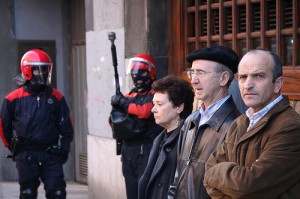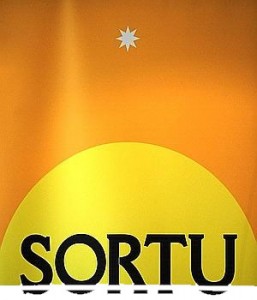There's little room for doubt now that the May 22 regional and municipal elections will mark a hugely significant change for Spain’s political map. The Popular Party (PP) is heading for an overwhelming victory, as underlined by the latest poll published by Metroscopia. The pollster points to major gains across the country for the conservatives, but the fact they now look poised to take traditional Socialist strongholds such as Seville and Castilla-La Mancha is the most striking development. Given that such enormous changes are afoot, it is strange –and frustrating– that this election campaign has not been more compelling. Instead of seeing the Socialists dig deep to fight for their … [Read more...] about Banality and pragmatism on Spain’s campaign trail
spanish politics
Common sense prevails as Bildu is allowed to run in elections
Just as the campaign leading up to the May 22 local elections was starting, the Constitutional Tribunal ruled on Friday that the Bildu Basque nationalist coalition should be allowed to take part. A vote of six votes to five reflects the intense political pressure surrounding this landmark vote. While there will inevitably be outraged voices in Madrid, the ruling is an encouraging sign that Spain’s highly politicised courts can take tough decisions based on the evidence before them, rather than vague suspicions that ETA terrorists must be at work behind the scenes. The izquierda abertzale, the pro-independence Basque left, has made substantial moves to prove its own democratic … [Read more...] about Common sense prevails as Bildu is allowed to run in elections
How did an independence vote become such a headache for Catalan nationalists?
Two very different interpretations can be made of the referendum organised on April 10 in Barcelona by a Catalan nationalist group. With just over 90 percent of votes backing the motion of an independent Catalonia, it could be argued this was an overwhelming success. But only one in five voters took part and the ballot is not legally binding, instead it is an attempt to promote separatism and the profile of those who want to break away from Spain. The organisers insisted that a 20-percent turnout was in fact a victory in itself, given that the series of similar referendums held in previous months across the region saw lower participation. Given the merely symbolic nature of this vote, … [Read more...] about How did an independence vote become such a headache for Catalan nationalists?
A shift in the Basque Country despite Sortu’s prohibition
On the face of it, the Supreme Court’s March 23 decision to deem the new Basque nationalist party Sortu illegal was yet another instance of Spain’s justice system refusing to give an inch to those it suspected of having links to the terrorist group ETA. Sortu had hoped to represent the birth of new hope for those wanting an independent Basque Country. The new formation unveiled itself in February, insisting it was not simply a continuation of Batasuna, ETA’s outlawed political wing. To prove this, the party’s statutes explicitly rejected the use of violence, including that of ETA, an unprecedented move for a group representing the izquierda abertzale, or radical Basque left. But on … [Read more...] about A shift in the Basque Country despite Sortu’s prohibition
Garzón appeals to Strasbourg over prosecution for Franco-era probe
Judge Baltasar Garzón has filed a case to the European Court of Human Rights challenging the lawfulness of his prosecution for opening an investigation into crimes committed during the Franco era. Judge Garzón was suspended from his position in the High Court in May of 2010 pending the outcome of his trial for abuse of power. No date has been set. In 2006, in line with his role as one of six investigating judges at Spain’s High Court, Garzón began a preliminary investigation following requests by the families of victims of repression by the Franco regime to ascertain the legality of a prosecution. His analysis of Spanish law, as well as the body of developed international law in this … [Read more...] about Garzón appeals to Strasbourg over prosecution for Franco-era probe
Sex for money… but don’t advertise it
“Bulgarian girl, 21 years old, available at homes and hotels from 12am to 9pm.” “Alina, all services €30, no limits.” “We are a couple of friends willing to give you pleasure and relaxation with utmost discretion.” For decades adverts for sexual services - ranging from the tactful to the graphically explicit - have filled the classified ads pages of Spanish newspapers. In a country where prostitution is neither legal nor illegal the personal ads sections of local tabloids, national dailies and magazines have long been the preferred medium for prostitutes and brothels to publicize their services. But under new proposals recently unveiled by the government, such adverts could soon be … [Read more...] about Sex for money… but don’t advertise it
March 11’s divisive legacy (revisited)
In the middle of February, the Spanish government announced that it was going to “repair” the memory of the poet Miguel Hernández, a Republican former goatherd who was jailed by the dictator Francisco Franco and died in prison in 1942, at the age of 31. The Socialist government pledged to offer Hernández, whose centenary is being celebrated this year, “the tribute, the memory and the admiration that his work merits,” said Deputy Prime Minister María Teresa Fernández de la Vega. “We all share that same rejection of any form of oppression, that same rebellion in the face of injustice and that determination to dream and create a decent country and a better world.” The news of this homage … [Read more...] about March 11’s divisive legacy (revisited)
Sortu puts spotlight on Spanish justice system
There have been many signs that genuine change is afoot in the Basque Country in recent months, as ETA’s political support has repeatedly urged the organisation to give a clear statement showing it is committed to a non-violent future. For the most part these expectations have not been met, with ETA failing to deliver – most recently in a January ceasefire statement that contained some new resolutions, but ultimately not enough. But the unveiling on February 7 of a new party, Sortu, suggests that with or without ETA’s backing, the pro-independence landscape in the northern region has changed. Sortu, which means “to rise up” or “be born” in euskera, is a reincarnation of sorts … [Read more...] about Sortu puts spotlight on Spanish justice system
Time is Zapatero’s enemy as he seeks to reform
The government and the unions are back at the negotiating table. This time, among the issues they are discussing are reforms to the pensions system and the proposal to delay the retirement age from 65 to 67. This willingness to talk is in many ways encouraging. It is a throwback to the days, not so long ago, when the Zapatero government and the unions got on so well it was hard to detect any ideological discrepancies between them. It also hints at political maturity on both sides. But it’s also important to remember that this pensions reform was first mooted in early 2010, as the government scrambled to fend off market hostility and Zapatero started moving away from his centre-left … [Read more...] about Time is Zapatero’s enemy as he seeks to reform
Economy the priority for Catalan election victors
Much has been made of the fact that the CiU nationalist candidate in the Catalan elections, Artur Mas, has said he would vote “yes” in a putative referendum on independence. However, having won the November 28 ballot in resounding fashion, he and his party will be worrying more about the state of the region’s economy than stoking the fires of separatism – at least in the short term. CiU won 62 seats in the regional parliament, up from 48 in 2006 and just six short of an overall majority, enabling it to govern alone for the next four years, although it will need help to push laws through. The governing Catalan Socialists saw their share of seats drop from 37 to 28 and their tripartite … [Read more...] about Economy the priority for Catalan election victors



